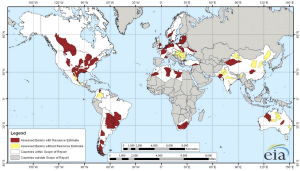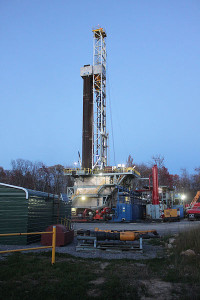Chevron Ends Romanian Gas Investment: Cites Economic Reasons
Chevron has recently decided to abandon plans to excavate for shale gas in Romania and attributes this choice to various economic factors, namely that further excavations in the country would not yield enough profit to make such a large-scale project worthwhile. As of October of 2013, the gas giant has already excavated at a depth of over 13,000 feet in the small locality of Pungesti in Vaslui County. However they encountered massive resistance from locals as well as NGOs while doing so. The cancelled shale project would have been the second largest pursued by the company, in Europe.

Romanian Prime Minister, Victor Ponta, is an avid supporter of Chevron’s projects in his country, citing that an internal shale gas source would be a monumental development for Romania because it would save the country from resorting to a daunting alternative, the Russian gas supply. In February of this year, the Prime Minister traveled to Washington DC to meet with representatives from large corporations, including Exxon and Chevron. He hopes to attract more foreign investors into Romania to improve the country’s economic standing as well as increase the number of jobs offered to its population. Chevron’s cancellation of the project is not a very welcome surprise but Ponta has admitted that the resources of shale gas in Pungesti were widely overestimated so, in truth, the gas giant’s decision is based purely on self-preservation.
Not everybody welcomed Chevron’s presence as readily. The inhabitants of Pungesti, for example, mounted extensive protests against Chevron’s project and its proximity to their homes. On December 7, 2013, protests took on a violent tone as locals tore down fences, threw stones, and even laid down in front of oncoming traffic in hopes of discouraging Chevron from pursuing shale gas excavations in their community. News of the project’s cancellation have brought jubilation to the small locality. One inhabitant was quoted as saying, “We are happy, we will have somewhere to grow our hens, animals, we will not be poisoned”. Most of the residents’ concerns revolved around the availability of land and the contamination of that land because many residents still derive their livelihoods from raising livestock and farming.

International NGOs also took up arms against the Chevron-Romania shale gas expedition. In July of 2014, twenty-five Greenpeace activists from seven European countries, including Germany, Austria, Poland, and the Czech Republic, blockaded the excavation site and peacefully protested with slogans such as “NO Fracking” written across their chests. Prior to the protest, legislative bodies in 11 neighboring counties had forbidden the excavation and extraction of shale gas due to the extremely harmful nature of the technology used in these procedures. Fracking is a method of shale gas extraction consisting of drilling a well a mile below the surface from which a horizontal corridor is drilled to serve as a gas well. This practice has been the most popular method for shale gas extraction in the last half century but its popularity has also put severe drains on nearby ecosystems. Fracking technology releases long-lasting pollutants that can be found in the water, soil, and organisms of the surrounding environment. Therefore the Pungesti residents fears of being “poisoned” as a result of Chevron’s excavations were not too far from reality.
The most recent dispute, however, has arisen over what Chevron’s real reasons are for abandoning what seemed to be a promising project for both itself as well as for Romania. Local residents and NGOs see Chevron’s desertion of the project as a testament to the success of their passionate protests. Experts beg to differ. Professor of Geology and Paleontology at the University of Bucharest, Corneliu Dinu, attributes the project’s sudden cancellation as largely the result of the falling price of shale gas. Leila Munteanu, from the Romanian news source Gandul, solidified Professor Dinu’s argument by saying that had Chevron’s profits from the Pungesti project been larger, the company would not have succumbed to any obstacles, be they Russian competition or widespread protests.
Although Chevron’s decision will prove beneficial for local residents and environmental stability, the same cannot be said for its effect on the future of Romania’s shale-gas production. Many questions still remain, the most important being whether or not Romania will ever be able to have an internal source of shale gas, a condition instrumental in its economic development, or whether the Black Sea state will have to rely on less favorable, international sources.
